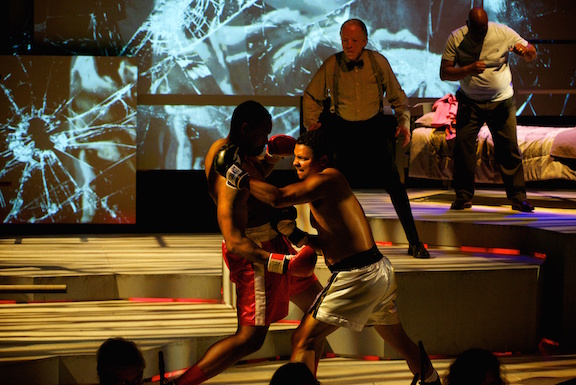
Terrence Blanchard’s musical eulogy
An older man sits hunched on a bed, holding a shoe. As he sings, his vibrant bass penetrating the surrounding darkness of the theater, he muses on the shoe and its missing mate. The shoe goes where it wants to go. Everything, it seems, has a mind of its own, except perhaps for the old man with the beautiful voice. His mind is lost to memory – to moments forgotten and to memories that trouble.
So opens Champion: An Opera in Jazz, trumpeter and jazz composer Terrence Blanchard’s poignant tribute to the boxer Emile Griffith.
This West Coast–premiere opened last weekend in San Francisco, and is a co-production of the SFJAZZ Center, where Blanchard is artist-in-residence, and the brilliant, ever-innovative Opera Parallèle. Nicole Paiement conducted and Brian Staufenbiel was the stage director. The collaboration brought the audience an evening of complex musical splendor, with voices of gorgeous color and resonance, showcased in thoughtful direction and embellished with glittering shoes.
During his career Emile Griffith held the world title for boxing several times over in both the welterweight and middleweight divisions. A young boy from an impoverished family in the Virgin Islands, abandoned by both parents, Griffith eventually came to New York City, plying his talents: to sing, to make hats and to swing a baseball bat. It was there that he reunited with his mother and met a hat factory employer who, seeing his muscled young body, sent him to a trainer.
In 1962 in a fight for the welterweight title Griffith battered Benny Paret into unconsciousness, 10 days later the Cuban-born boxer died never having regained consciousness. ABC’s live broadcast of the fight led to a 20-year moratorium of public broadcasts of boxing. But the match led to a deeper questioning of the sport. Before the fight, Paret had taunted Griffith about his sexuality, grabbing his buttocks and calling him a maricón, or faggot. Griffith had been enraged. Despite an investigation, responsibility for Paret’s death was never determined.
Griffith’s incisive observation about death and love rules the opera: “I kill a man and most people understand and forgive me. However, I love a man and to so many people this is an unforgivable sin.”
The boxer’s life unfolds in the libretto by Pulitzer Prize–winning playwright Michael Cristofer. The action of the play takes place in a series of flashbacks strung between the original scene of Griffith dressing to meet the son of the Benny Paret and his actual meeting with Benny Jr. The structure is a bit unwieldy and at times difficult to follow, but the words are sparse and clear, repetition underlining not only the dilemma of Griffith’s fight-induced dementia, but also providing a net of vocal sound to use in sync with the orchestra’s jazz riffs.
The singers are wonderful in their range: from the boy soprano Emile as a child (Moses Abrahamson) to the brash insistences of Emile’s trainer (Robert Orth) to the velvet baritone of Emile in his prime (Kenneth Kellogg, who by the way is no welterweight, even though he looks great in either a flash green suit or red trunks) to the breathtaking bass of Emile in his old age (blessings upon you, Arthur Woodley).
Sopranos Karen Slack as Emile’s mother and Chabrelle Williams, Griffith’s wife Sadie, along with mezzo Michelle Rice as Kathy Hagan, owner of the gay bar, and soprano Aisha Campbell, Cousin Blanche, added luxuriant female voices.
As detailed as the production was, it was the instrumental music that was true champion in the opera. The score combines opera’s orchestral sound with a jazz trio, and Blanchard’s diverse orchestration was always intriguing. The use of brass was understandably dazzling, with the trombones laying down insistent jazz rhythms one moment, and the French horns sounding an emotionally fraught dissonance the next. Maestra Nicole Paiement led the combined forces.
One especially incandescent moment was the second-act aria by Karen Slack, “Long ago and far away.” Slack was accompanied only by Marcus Shelby on bass, combining their fervent musical skills. Slack with a complex texture of vocal sound and Shelby with a quiet and subtle accompaniment. Divine.
– Jaime Robles
Champion: An Opera in Jazz continues until February 28 at the SFJAZZ Center on Franklin Street in San Francisco. Most performances are sold out, but for information on tickets, visit operaparallele.org. The next Opera Parallèle production is the Peter Maxwell Davies’ opera, The Lighthouse, in late April-May at Z Space.
Photo: (L to R) Kenneth Kellogg as Emile Griffith in his prime, Victor Ryan Robertson as Benny “Kid” Paret, Mark Hernandez as the Ring Announcer and Arthur Woodley as Old Emile Griffith in the Opera Parallèle and SFJAZZ co-production of Terence Blanchard’s “Champion: An Opera in Jazz”. Photo by Bill Evans.
